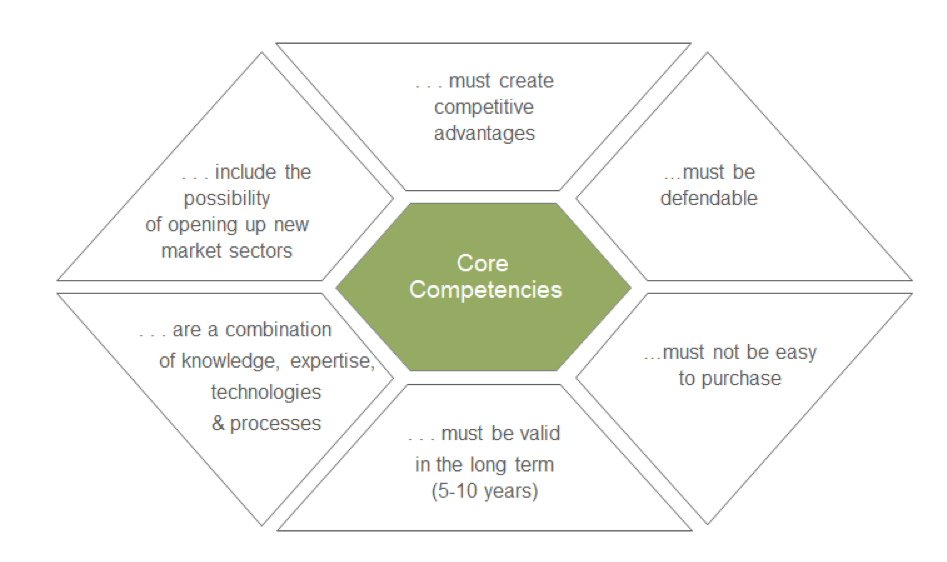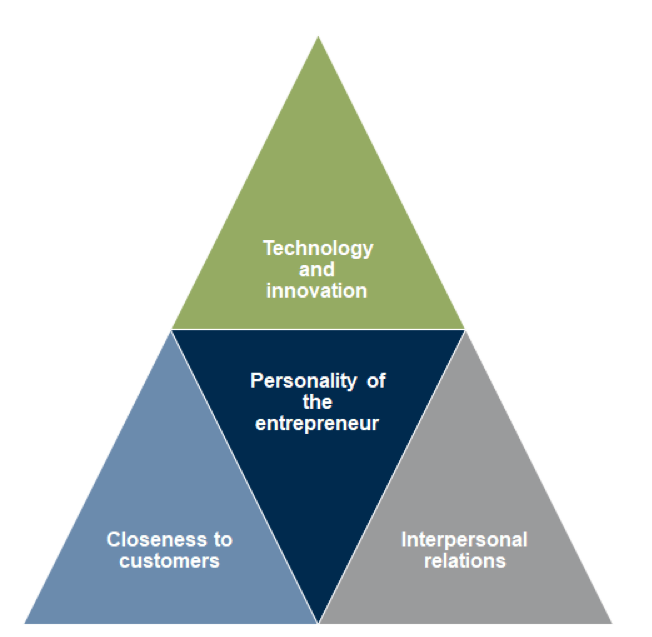
Diversification brings success – it’s a business advice mantra repeated often enough it verges on the platitudinal.
While not entirely untrue, what the statement fails to address is the fact that many companies find success through extremely focused models. By concentrating financial and temporal resources, businesses can manifest incredible penetrating power. Academic Hermann Simon’s[1] theory of concentration points to this quality as the defining factor in the success of so-called “hidden champions”, companies that are not necessarily well-known but are among the top three in the world market.
The fact that concentration characterises some the most successful family-owned companies is reiterated by the results of “Radically Different: the DNA of Successful Family Businesses,”[2] a survey of over 200 entrepreneurs from Switzerland, Germany, Austria and Italy. However, while a concentrated approach is made apparent by the findings, it is less clear exactly what the focus is. Do they have specific products, outstanding services or their own processes or procedures? Are there certain skills, methods or technologies in place?
For example, Flexi is the world market leader in telescopic dog leashes, Berhalter builds unique machines to package pet food, Durst photo technology designs giant printers that print on every conceivable surface including tiles, Beyer Chronometry is the oldest watch manufacturer in Switzerland, and Wollsdorf Leder is the world market leader for the manufacture of steering wheel covers. Their concentrations are explicit. However, what makes these companies specialists? In “Radically Different,” this concentration is an indication of their core competencies.
What are Core Competencies?
Successful family businesses focus on their core competencies, visible proof of which are to be found in the company’s products and services, but also in their applied procedures, processes and technologies.
In the early 90s, C.K. Prahalad[3] and Gary Hamel[4] described the concept of core competencies in business management theory as, “…The skills that enable an essential understanding of a fundamental customer benefit.”
Core competencies are the metaphorical engine where a company’s strength is produced. This power drives the creation and performance of new unique selling points, which take the form of attractive products and services, differentiating emotional factors or a unique package of them.
That said, core competencies are not competitive advantages. The latter are obvious to everyone and purchasable, as products and services, as well as recognisable emotional advantages of a company. Core competencies, on the other hand, aren’t so recognisable but do have specific characteristics, which are indicative of their power.

Core competencies:
- Are a combination of detailed knowledge and expertise gained through experience, intelligent development or use of existing and future-relevant technologies and self-developed, continuously honed processes.
- Are not for sale. Even through acquisitions, core competencies are often lost through failures in the delicate integration processs, which is paradoxical because the parent company’s main goal in an acquisition or merger is often to buy new core competencies.
- Are capable of defending. Because of their complexity, core competencies are not easily copied and thus have the ability to defend well.
- Have the potential to open up market opportunities – new areas of business in which existing core competencies are applied can be approached with relatively low risk.
- Are strategic in the long term.
- Create superior customer benefits and thus competitive advantages.
Core competencies must be highly relevant in meeting customer needs and highly unique in the sector. Success factors carry just as much weight as core competencies when it comes to customer loyalty but lack uniqueness. Of course, success factors are important for any business but insufficient for long-term differentiation because they are relatively easy to copy. In the absence of customer relevance, the company delivers a standard with its products and services, which are not sufficient for sustained, successful positioning. If the company has a low level of customer suitability but is highly unique, the company must invest in the future of potential new core competencies or risk redundancy. In this case, the company has a core competency potential that no one needs.
Core competencies are not anchored in machines, robots or digital systems; they reside in people. The skills, knowledge and experience of people are core competencies that serve as the basis for intelligent application, adaptation and use of technologies and processes. The challenge is to spread these core competencies across many employees and then retain them.
The Four Key Core Competencies of Successful Family Businesses

The study “Radically Different: the DNA of Successful Family Businesses,” found that sustained success in family business is tied to four distinctive core competencies.
- It is particularly challenging to replace entrepreneurial founders, a core competency in their own right, especially in the case of family businesses transitioning to the second or third Contrary to the widespread opinion that a person alone cannot be a core competency, we see in practice that entrepreneurs are often the cause for the creation of competitive advantages. These companies must work to close this breach in the succession process. If it is assumed that the creation of strong core competencies takes five to ten years, it becomes clear which lead time is required in the sense of maintaining a company’s viability.
In addition to the core competency of the entrepreneur, three additional core competencies distinguish the best family businesses from others: technology and innovation, exceptional customer relationships and network competence.
- In the most successful companies, technology and innovation competence is a crucial core competency, even though it takes on different aspects between companies and industries. For example, Dr Schär, world market leader for gluten-free products, interprets the core competencies associated with technology and innovation differently than Victorinox. In essence, however, there are no differences. No matter how these companies apply their competencies, they both generate competitive advantages.
- Exceptional customer relationships are another core competency. This quality is not a matter of customer orientation but a positive form of fanaticism. Christoph Kasslatter, managing director of the successful Clean, Food and Facility Specialist Markas of the Kasslatter family, describes this customer proximity as a culture of caring:
“Everyone can make mistakes. Anyone who does not make mistakes does not work at all. However, everyone and the company as a whole must learn from the mistakes. And what we should never allow is that we do not care about these mistakes, especially when customers are affected. We are caretakers. That makes us different in our customer relationships.”
In the most successful companies, this over-pointed customer proximity is a lived culture, which shows itself through actions and behaviours daily.
- Network competence is the fourth defining core Active entrepreneurs, managers and members of corporate families know the value of networking. Open, transparent lobbying in purpose-built communities is an integral part of business practice. Network competency inevitably creates competitive advantages. In the case of multigeneration family businesses, keeping these networks through the succession process is imperative. Relationships are fundamental when it comes to networking competency, and maintaining relationships requires time, character and personality.
Defining and then investing in existing and future core competencies is probably the most important strategy for any company — this is especially true for family businesses. Limited financial and human resources in family companies can result in life-threatening situations if their strategic core competencies are lack clarity and are not fully implemented. Without core competencies, it is impossible to create the necessary competitive advantages; without competitive advantages, there is no chance of survival.
Prof. (FH) Dott. Markus Weishaupt is a family business expert, Partner and CEO of Weissman & Cie. Italia. He accompanies family businesses as well as entrepreneurial families in their cultural, strategic, organisational and leadership challenges in his role as an international consultant and as a member of family and company boards. He is Professor at the University of Applied Sciences in Kufstein (Tirol-Austria), author and speaker on issues concerning the world of family businesses.

[1] Hermann Simon, Die heimlichen Gewinner: die Erfolgsstrategien unbekannter Weltmarktführer. Campus Frankfurt a.M.1996.
[2] Markus Weishaupt, Radikal anders. Die DNA erfolgreicher Familienunternehmen. Campus Verlag, 9/ 2015.
[3] C. K. Prahalad (Coimbatore Krishnarao Prahalad) was the Paul and Ruth McCracken Distinguished University Professor of Corporate Strategy at the University of Michigan. He co-authored Core Competence of the Corporation with Gary Hamel and worked as a business consultant and author.
[4] Gary Hamel, a graduate of the Ross School of Business at the University of Michigan, is head of Strategos, a consulting firm in Chicago, and Visiting Professor of Strategy Management at the London Business School. The Wall Street Journal ranked Gary Hamel as one of the world’s most influential business thinkers.









